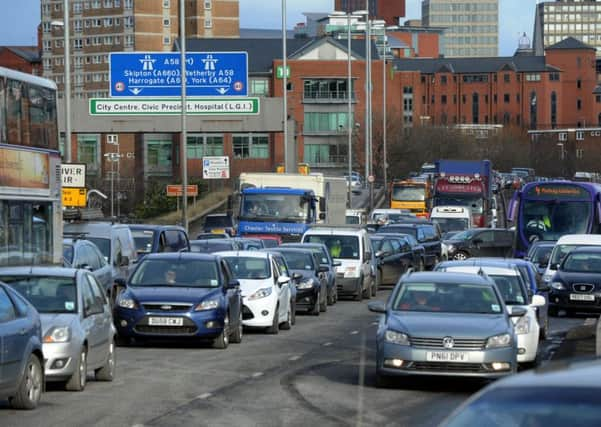Will Leeds clean air tax be a '˜back door congestion charge'?


New regulations, part of a planned Clean Air Zone (CAZ) in Leeds, could also see taxpayers coughing up more than £1m to pay for a network of cameras in the city.
The measures are revealed in a report being debated by Leeds City Council licensing chiefs tomorrow (Tuesday).
Advertisement
Hide AdAdvertisement
Hide AdUnder the plans, vehicles that don’t comply with engine standards will be required to pay a daily fee or levy to enter the CAZ.
Newer vehicles that meet the latest emissions standards will not have to pay, and under current plans, neither will private cars.
However motoring campaigners are worried that introducing new levies in a relatively short space of time could still leave huge swathes of drivers out of pocket - and is tantamount to a “congestion charge by the back door”.
A major scoping study is already under way in Leeds after the city was named the third worst UK hotspot for air quality.
Advertisement
Hide AdAdvertisement
Hide AdLeeds is one of five cities ordered by the Government to introduce Clean Air Zones by 2020 to discourage older, higher emission vehicles from operating in city centres whilst encouraging replacement of these vehicles with newer, cleaner ones.
The city is in the ‘Class C’ action category, meaning it must impose new regulations for buses, coaches, taxis, HGVs and light good vehicles as well as taking “additional local action”.
The report being discussed by the Leeds council panel tomorrow says the authority’s cabinet will make its recommendations on the size of the city’s CAZ, and the fines and enforcement processes attached to it, in February 2017.
The zone itself will be enforced by the end of 2019, it adds.
Advertisement
Hide AdAdvertisement
Hide AdThe report explains that vehicles which do not comply with engine standards “will be required to pay a daily fee or levy to enter the zone”.
It also raises fears that the taxi and private hire trade will be particularly badly hit by the new rule, because they use the roads more and therefore emit more.
But the wide ranging scoping study is not limited to taxi and private hire cars.
Data on all vehicle categories is being collected in order to “determine emission impacts and therefore inform recommendations for the size and location of the Clean Air Zone”.
Advertisement
Hide AdAdvertisement
Hide AdLuke Bosdet, public affairs spokesman for the AA, said the main concern for motorists should be “what happens next”.
“Is this congestion charging through the back door - a move rejected by 79 per cent in Manchester in 2008?” he said.
He added: “The mention of cameras needing huge amounts of money to pay for them instinctively sends a shiver down motorists’ spines.
“The fear is that they need to catch drivers to pay for their upkeep. As the car population becomes cleaner due to turnover, income from fines should reduce.”
Advertisement
Hide AdAdvertisement
Hide AdPaul Landau, chair of the Leeds taxi section of the Unite union, said the concern for drivers was not necessarily the imposition of clean air zones, but the financial impact of introducing them too quickly.
“A clean air zone is completely understandable, but there has to be a proper run in,” he said.
“There is a huge financial cost implication for drivers.”
A damning report earlier this year said urgent Government action was needed to stop up to 50,000 people a year dying early from air pollution-related illnesses.
In its report on Air Quality, the DEFRA (Department of Environment, Food and Rural Affairs) Select Committee pressed for new Clean Air Zones in dozens of English towns and cities to cut the risk of cardiac, respiratory and other diseases caused by polluted air.
Advertisement
Hide AdAdvertisement
Hide AdOf other Yorkshire cities, York is already putting together its own vision for cleaner air. City of York council has previously unveiled a package of proposed measures, including regulating bus emissions and a wider electric vehicle recharging network.